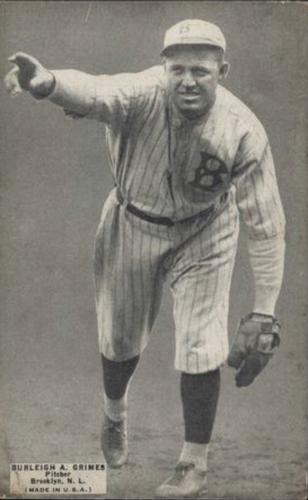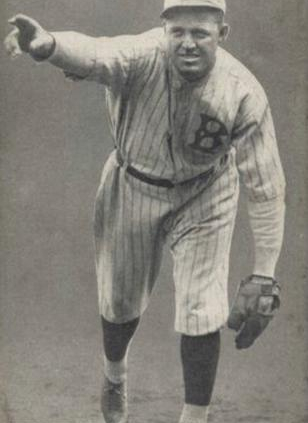September 10, 1916: Pirates’ 6-run ninth completes comeback and makes Burleigh Grimes a winner in debut
 “The Buccaneers turned impending defeat into a glorious victory snatched from the very jaws of disaster” gushed the Pittsburgh Press about the Pirates’ six-run ninth inning to beat the Chicago Cubs, 8-7, in the Windy City.1 The Pittsburgh Post called the Deadball Era offensive explosion a “sensational slugfest,”2 while sportswriter J.J. Alcock of Chicago Tribune considered it “one of the gamest rallies” ever witnessed in the metropolis on Lake Michigan.3
“The Buccaneers turned impending defeat into a glorious victory snatched from the very jaws of disaster” gushed the Pittsburgh Press about the Pirates’ six-run ninth inning to beat the Chicago Cubs, 8-7, in the Windy City.1 The Pittsburgh Post called the Deadball Era offensive explosion a “sensational slugfest,”2 while sportswriter J.J. Alcock of Chicago Tribune considered it “one of the gamest rallies” ever witnessed in the metropolis on Lake Michigan.3
The Pirates and Cubs had little to play for as the 1916 season came to a close except for an outside chance to move into the first division. Baseball schedule makers, however, had done them no favors in September. A day after suffering consecutive shutout losses in a Sunday afternoon doubleheader sweep by the Cubs at Forbes Field, Jimmy Callahan’s fifth-place Pirates (61-69) faced the sixth-place Cubs (61-72) again, but some 460 miles away in Chicago. It marked the Pirates’ first game of a grueling road swing during which they played 23 games in 18 days, including eight twin bills. The Cubs barely had time to unpack. After just one game in front of their partisan fans, manager Joe Tinker’s squad commenced an 18-game road trip.
It was a gorgeous late summer day in Chicago with clear skies and temperatures in the low 70s as the two teams met at Weeghman Park.4 The Cubs were finishing their first season playing in the three-year-old ballpark, which had originally been built for the Chi-Feds/Whalers of the upstart Federal League. When that circuit disbanded after the 1915 season, club owner Charles Weeghman bought the Cubs and relocated them from their wooden park on the west side of the city.
Prior to the game the Cubs received some bad news. Their second baseman, former MVP Larry Doyle, whom they had acquired two weeks earlier in a blockbuster trade with the New York Giants, would miss the rest of the season. He had broken his ankle in the first game of the doubleheader the day before.5
On the mound for the Cubs was left-handed swingman Gene Packard (9-6), who had starred in the Federal League in its two-year existence, winning 20 games twice for the Kansas City Packers. Through the first five innings, Packard “southpawed with pleasing effect,” cooed Alcock, mowing down the Pirates on three scattered singles.6 It must have been a strange sensation for Packard when the crowd erupted in a “spontaneous ovation” after a Pirates batter dug in at the plate in the second inning.7 That player was Frank “Wildfire” Schulte, a star from the Cubs’ dynasty that captured four pennants and won two World Series titles in a five-year stretch (1906-1910). Making his first appearance in Chicago since his trade to the Pirates on July 29, he smacked a “vicious liner,” noted the Post, but right to center fielder Les Mann for an out.8
The Cubs took the lead in the first inning against right-handed rookie Frank Miller. A surprise find for the Pirates, Miller (7-9, 2.09) had tossed a four-hit shutout in his last start, but lacked that sharpness in this outing. With two men on (via a single and walk), rookie Earl Smith, making his major-league debut, stroked a two-out triple to left to put the Cubs on the board. The Cubs tacked on three more in the fourth. Vic Saier led off with a double, moved to third on Smith’s single, and scored on Jimmy Archer’s sacrifice. Singles by three of the next four hitters brought in two more runs. Chuck Wortman and Rollie Zeider, the latter on a two-out hit-and-run, picked up an RBI to build the Cubs’ seemingly commanding 5-0 lead.
In the bottom of the fifth, Callahan sent in a rookie hurler who had just joined the team that morning: Burleigh Grimes. A 22-year-old right-hander who had won 20 games for the Birmingham Barons in the Southern Association, Grimes retired the Cubs in order. The Pirates gave the recruit two runs to work with in the sixth. Max Carey led off with a single and came home on Bill Hinchman’s blast to left field that “took a mighty bound and landed in the seats,” reported the Post, for a two-run home run.9
Save for the Pirates’ ninth-inning heroics, Grimes would have been the team’s bright spot of the day and “seen his name in large type” in the newspaper, opined the Tribune.10 Thrust into an emergency appearance, Grimes pitched four innings and yielded just three hits, though he struggled with his control, walking four. Sportswriter Charles J. Doyle of the Pittsburgh Gazette-Times noted his “fine delivery and plenty of speed” to go along with a spitball.11 He yielded two runs in the seventh, but also exhibited coolness under pressure. Max Flack walked to start that frame and raced to third when Mann beat out a bunt and Grimes’ throw to first sailed into right field for an error. Saier knocked Flack in and Mann scored on Smith’s sacrifice to give the Cubs a 7-2 lead. The Pittsburgh Press reported on Grimes’ “peculiar experience” at Weeghman Park.12
“[A]ccustomed to pitching from a strictly level box,” said the paper, Grimes felt that Weeghman Park’s nine-inch-high pitching mound was like “on a hill.”
A weak offensive team ranking last in the NL in runs scored with just 3.08 per game, the Pirates exploded in the ninth and “started to hammer the ball to all parts of the field,” wrote Doyle.13 Walter Schmidt led off with a single and moved to third on third baseman Charlie Pechous’s throwing error. After Grimes fanned, Packard fell apart. Frank Smykal’s single scored Schmidt and Carson Bigbee also singled. With three balls to Carey, Packard was pulled in favor of Mike Prendergast, a former Whalers hurler. He completed the walk to load the bases, then dodged a bullet when Hinchman popped up to second base. And then the wheels fell off.
With Honus Wagner at the plate, Prendergast uncorked a wild pitch that brought in a run. Still a threat at age 42, Wagner singled, driving in two more, to pull the Bucs to within one run. Hometown hero Schulte, who had blasted a double off the right-field wall in the previous inning, collected his third hit of the game, a deep line drive that looked like a triple, opined Doyle, but Mann made a good play to hold Schulte to a single and keep Wagner at third.14
Doug Baird rapped a bullet that “almost crippled” shortstop Chuck Wortman, wrote the Gazette-Times, while Wagner crossed the plate to tie the game.15 Schmidt collected his second single of the inning, driving in Schulte to give the Pirates an 8-7 lead and complete the comeback with “high class” battling, lauded the Press.16
The Pirates weren’t out of trouble yet. After flying out to end the top of the ninth, Grimes was back on the mound and issued a leadoff walk to Flack. Callahan yanked Grimes and called on Al Mamaux, the club’s best starter, who had won 21 games in 1915 and would finish with the same number in 1916. Flack moved up a station on a passed ball and Mann’s sacrifice. Needing just a deep fly ball to tie the score, Saier popped up to the catcher. Mamaux then denied rookie Earl Smith a chance for a fairy-tale ending to his debut by striking him out and ending the game in 1 hour and 50 minutes.17
The Pirates’ stunning comeback made Grimes a winner in his big-league debut. After a rough first full season with the Pirates in 1917, he was traded to the Brooklyn Robins (Dodgers), with whom he became a star and built his Hall of Fame bona fides.
Just hours after the game, the Pirates boarded a train bound to Buffalo, New York, en route to play an exhibition game the following day in Binghamton. Their road trip proved disastrous. They won only four of 23 games (and also tied two) and finished the season in sixth place (65-89). The Cubs didn’t fare much better, winning just four of 18 games with one tie, and finished in fifth place (67-86).
Sources
In addition to the sources cited in the Notes, the author accessed Retrosheet.org, Baseball-Reference.com, SABR.org, and The Sporting News archive via Paper of Record.
Notes
1 “Pitcher Grimes Looks Like Find,” Pittsburgh Press, September 11, 1916: 20.
2 “Buccos Surprise Bruins,” Pittsburgh Post, September 11, 1916: 8.
3 J.J. Alcock, “Pirates Defeat Cub Team, 8 to 7, by Six in Ninth,” Chicago Tribune, September 12, 1916: 13.
4 “The Weather,” Chicago Tribune, September 11, 1916: 1.
5 “Doyle Out for the Year,” Chicago Tribune, September 11, 1916: 13.
6 Alcock.
7 Charles J. Doyle, “Pirates Rally in Ninth and Beat Cubs, 8-7,” Pittsburgh Gazette-Times, September 11, 1916: 6.
8 “Buccos Surprise Bruins.”
9 “Buccos Surprise Bruins.”
10 Alcock
11 Doyle.
12 “Pitcher Grimes Looks Like Find,” Pittsburgh Press.
13 Doyle.
14 Doyle.
15 Doyle.
16 “Pitcher Grimes Looks Like Find,” Pittsburgh Press.
17 The Chicago Tribune gave the game time as 1 hour and 50 minutes. Pittsburgh papers had 2 hours.
Additional Stats
Pittsburgh Pirates 8
Chicago Cubs 7
Weeghman Park
Chicago, IL
Box Score + PBP:
Corrections? Additions?
If you can help us improve this game story, contact us.


